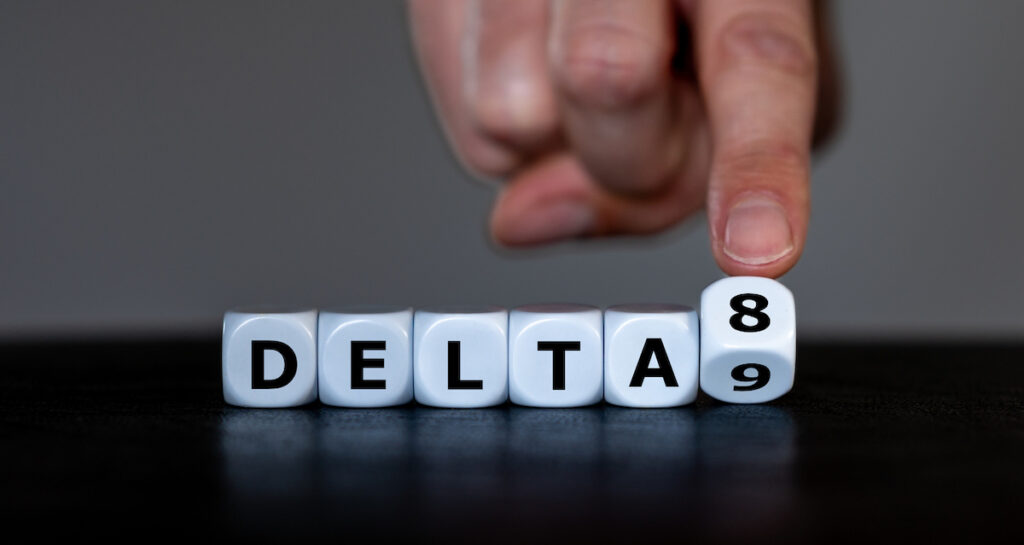The cannabis space is continuously evolving, and LegitScript is here to shine a light on one of the most noteworthy cannabinoids currently marketed online — delta-8 THC. Read this expanded-on excerpt from Top 10 High-risk Trends That Put You at Risk of BRAM and GBPP Fines to understand what delta-8 THC is, and why you should watch out for it.
What is Delta-8 THC and How Does It Differ From Delta-9 THC?
There are many chemical compounds present in cannabis, referred to collectively as cannabinoids, with the most well-known cannabinoids being tetrahydrocannabinol (THC) and cannabidiol (CBD). At the federal level, one specific isomer of THC, delta-9 THC, is listed as a Schedule I controlled substance under the Controlled Substances Act (CSA). This is the psychoactive substance most commonly associated with marijuana.
Delta-8 THC is a tetrahydrocannabinol isomer usually derived from hemp. Meaning, it has the same chemical formula as delta-9 THC, but the atoms are arranged differently. Like delta-9 THC, delta-8 THC is known to be psychoactive, though it is generally considered less potent.
Is Delta-8 THC Legal?
The passage of the Agriculture Improvement Act of 2018 (i.e., the 2018 Farm Bill) removed hemp from the definition of “marihuana.” Because delta-8 THC is generally derived from hemp, advocates claim that this form of delta-8 THC became legal with the passage of the 2018 Farm Bill. But it’s more complex than that.
In August 2020, the DEA issued an interim rule implementing the provisions of the 2018 Farm Bill which stated that "all synthetically derived tetrahydrocannabinols remain Schedule I controlled substances.” This language was significant because delta-8 THC is only naturally found in trace amounts (i.e., less than 1%) in dried cannabis flower, regardless of whether the flower is marijuana or hemp. A product containing any substantial amount of delta-8 THC would almost certainly have to be produced synthetically through a relatively complicated extraction, isolation, conversion, and refinement process.
For this reason, many argued that delta-8 THC products are synthetically derived tetrahydrocannabinols, and therefore remain controlled in the United States under the CSA.
The DEA did not provide clarification on how it defines “synthetically derived.” However, last year the administration made several statements signaling that it did not consider delta-8 THC to fit squarely within the CSA if it contains less than 0.3% delta-9 THC.
At the state level, at least 14 states currently ban delta-8 THC entirely, including ones that currently allow the recreational use of delta-9 THC products. State-level concerns largely center on preventing minors from accessing a psychotropic substance, the contents of which have likely not been verified by a lab.
Many merchants are now marketing delta-8 THC products, but not without regulatory scrutiny regarding the safety of the products, including problematic marketing claims.
How Is the FDA Approaching Delta-8 THC?
In addition to state bans, the US Food and Drug Administration (FDA) for the first time issued warning letters in mid-2022 regarding products that contain delta-8 THC. Letters were issued to five companies that were marketing products labeled as containing delta-8 THC in ways that, according to the FDA, violate the Federal Food, Drug, and Cosmetic Act (FDCA). Additionally, the FDA stated that delta-8 THC is an unsafe food additive under the FDCA.
The FDA has noted that between December 2020 and February 2022, it received more than 100 adverse event reports, more than half of which required intervention or hospitalization, and included hallucinations, vomiting, and loss of consciousness. It’s unclear whether this is related to the actual substance or to impurities left behind during poorly regulated manufacturing processes. Likewise, poison control centers received more than 2,000 cases of poisoning from delta-8 between January 2021 and February 2022, including one pediatric case that resulted in death.
What About Other Cannabinoids?
LegitScript is seeing dozens of other cannabinoids marketed online in a variety of products, including e-liquids, capsules, tinctures, gummies, chocolate, and more. All of these deserve scrutiny. One, in particular, is THC-O.
The DEA recently issued a letter noting that it considers two forms of THC-O — delta-9 THC-O and delta-8 THC-O — to be Schedule I controlled substances. THC-O is marketed as a psychedelic cannabinoid and is purportedly up to 300% stronger than delta-9 THC.
The DEA has noted that, unlike delta-8 THC, these forms of THC-O do not occur naturally in the cannabis plant and can only be obtained synthetically; therefore, they cannot be considered hemp. Because their chemical structure is similar to naturally occurring tetrahydrocannabinols, they meet the definition of tetrahydrocannabinols in the controlled substances act, which is Schedule I.
Take A Deep Dive into Delta-8 THC
Are you interested in learning more about delta-8 THC and other cannabis compounds? Watch the first installment of our Deep Dive Webinar Series at the button below and you’ll discover:
- The regulatory landscape surrounding recently marketed cannabinoids
- Problematic products containing delta-8 THC
- Other cannabis-derived product trends




